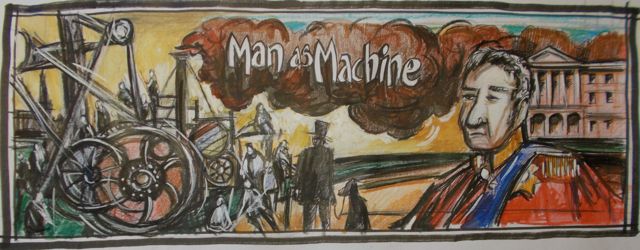Despite the fact that the King of France had been overthrown, that all sorts of independence activity was going on in the Netherlands, this alone was not enough to convince Earl Grey’s Whig government that real and deep reforms were needed. One of the principle goads was the astonishing level of hostility generated throughout England by the now landless poor. In late 1831 the House of Lords rejected the Reform Bill in the midst of an economic downturn. This double whammy was felt so heavily that food riots, combined with sheer frustration and anger, erupted all over the country.
The middle-class reformers, who had worked so hard to achieve their goals were suddenly swept aside. Mobs attacked and burned buildings, castles and whole towns. The entire city of Bristol was taken over and held for three or four days. Mobs openly attacked the King’s carriage as it progressed through the streets of London. Derby jail, another obvious symbol of oppression, was broken into and sacked. These sorts of activities were repeated all over the country, during which Nottingham Castle was put to the torch. There is little doubt that had economic conditions been otherwise, if trade had been brisk and people employed, the level of rioting would have been much less. Equally, the level of Reform in Grey’s Bill would have been much less. In the end it was the entrenched ‘Born to Rule’ utter blindness of the House of Lords, combined with the worst possible economic conditions which galvanised the drive for reform. Naturally enough, the reformers were now in something of a panic. With all of the rioting, widespread as it was, there was a great danger that the mob would triumph, and that all of the reformers’ efforts would go for naught. Reformers, Radicals, middle and working class, Whig aristos (and terrified Tories) combined to support the Bill in it’s entirety. Widespread unemployment continued into 1832, aiding the cause. The Bill was passed, with minor amendments, in 1832.
What was achieved, in the end?
In all about 200 of the ‘rotten boroughs’ had their seats removed and redistributed to areas which had hitherto had no representation at all. 56 of these ‘rottens’, returning about 110 members were abolished, about 30 or so reduced from two to a single seat, and some of the other bigger boroughs reduced from four seats to two.
At least three dozen important towns received, for the first time, parliamentary seats, the biggest receiving two seats and the remaining twenty, one seat each. Birmingham, Swansea, Manchester, Sheffield, Bradford and Leeds amongst other industrial towns were granted parliamentary seats. In London, the capital, at least four new constituencies were created, the City of London already having four seats, in addition to the old seats of Southwark and Westminster.
In the English countryside, large counties were broken up into smaller constituencies and the number of seats rose from 94 to 159.
All of these reforms were undoubtedly revolutionary, hugely welcome and probably halted all thoughts of revolution in their tracks. Nevertheless, and welcome as these reforms were, it continued to mean that four out of every five men still didn’t have the vote. The landless worker, the agricultural labourer still did not have the franchise. This was not accidental; the Tories, the Whigs, and the arriviste middle class had one thing in common; money. If the new money had no sophistication, no education and no style it at least had the money to rectify these deficiencies.
How successful were they in achieving these goals?
The rise of the middle class in England, despite the glorious examples of Chippendale and Hepplewhite, produced some of the most spectacularly tasteless drawing room vulgarity on earth. Despite what the ‘experts’ say, Victorian glassware, furniture and ceramics are some of the most hideous ‘decorative’ items known to man. The fact that auctioneers value them highly nowadays merely serves to prove that vulgarity is alive and well in the hallowed halls of our great auction houses.
TO BE CONTINUED

